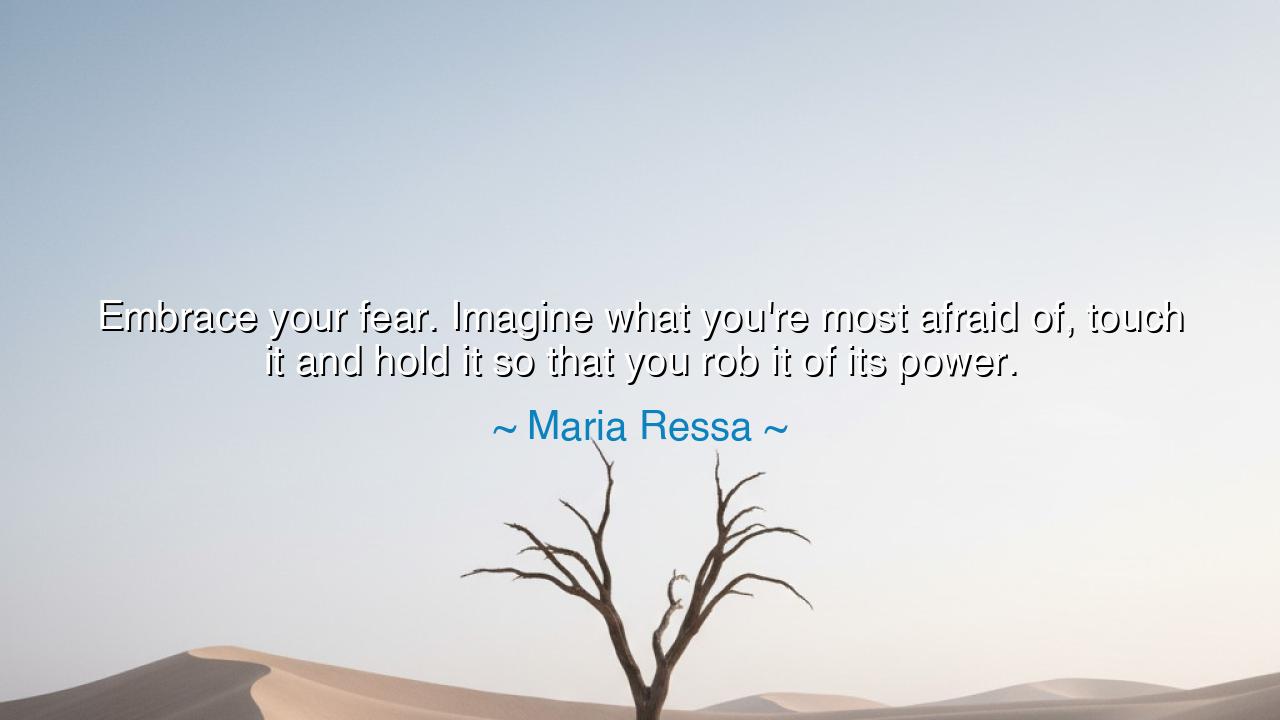
Embrace your fear. Imagine what you're most afraid of, touch it
Embrace your fear. Imagine what you're most afraid of, touch it and hold it so that you rob it of its power.






In the words of Maria Ressa, “Embrace your fear. Imagine what you're most afraid of, touch it and hold it so that you rob it of its power,” we are given a teaching as sharp as a blade and as tender as a prayer. Fear is the shadow that stalks all mortals, yet Ressa commands us not to flee it, but to embrace it, to seize it with both hands, and in so doing to strip it of the dominion it holds over the soul. For that which is faced ceases to be master, and that which is held ceases to be untouchable.
The wisdom here is ancient: to confront fear is to transform it. Alexander the Great, before crossing into Asia, burned his ships so that retreat was impossible. His men trembled at the thought of defeat, but by embracing the very fear of destruction, they became invincible. Likewise, Ressa urges us not to ignore dread, nor to pretend it does not exist, but to stand before it boldly until its terror becomes familiarity, and its chains fall away.
Her words also remind us of the nature of power. Fear has no substance of its own; it thrives on avoidance and silence. When unchallenged, it grows monstrous, yet when touched—named, examined, and embraced—it withers. Just as a child learns that the dark hides no demon once a light is kindled, so too the adult learns that the specter of fear shrinks when grasped with courage.
Consider also the tale of Nelson Mandela, who, though imprisoned for decades, confessed that courage was not the absence of fear, but the triumph over it. Each day he rose to face his captors, he embraced his fear of death and despair, and by doing so, he robbed the prison of its power. In time, the very thing that was meant to crush him instead prepared him to lead a nation into freedom.
Thus let this teaching endure: do not run from your fear, for it will only chase you. Do not bury it, for it will only grow. Instead, take it in your hand as one takes a serpent, feel its weight, and learn its shape. For in touching it, you will see it for what it is—not a god, but a shadow. And once robbed of its power, fear becomes not your master, but your teacher, guiding you toward the strength that was within you all along.






VTVy Tran
I find Maria Ressa’s approach to fear fascinating. The idea that embracing our fear can diminish its control over us is incredibly empowering. How often do we allow fear to dictate our decisions, only to realize it’s often less frightening when we confront it? Does this technique work for all types of fear, or are there some fears that require a different approach to truly break free from them?
HLChu ha linh
Maria Ressa's idea of ‘touching and holding’ our fears to rob them of their power is a unique perspective. It seems like a powerful metaphor for taking ownership of our emotions. But how does this apply to real-world fears, especially those related to larger social or personal issues? Could this mindset be the key to transforming fear into a tool for personal growth and empowerment?
HNHung Ngo
I really resonate with Maria Ressa’s idea of embracing fear as a way to disempower it. It seems like we often give fear more power by avoiding it, when in reality, confronting it could help us grow stronger. But I wonder—how do we know when it’s time to face our fear and when it’s best to seek help or take a step back for our own well-being?
QHPhan Quoc Hung-7A1
Maria Ressa’s approach to fear seems like a radical but freeing way to overcome it. Often, fear has power over us when we let it grow in the dark. But by confronting it directly, do we take away its power? Could facing our fears in this way make them seem less daunting? How might this method help us break free from the cycle of anxiety and self-doubt we often face?
TT.My
I love how Maria Ressa encourages us to not just face our fears but actually embrace them. It’s a bold way to take control of something that usually holds us back. But can this strategy work for everyone? Some fears can be deeply ingrained or traumatic. How do we balance confronting fear with taking care of our mental health and ensuring we're not pushing ourselves too far too fast?